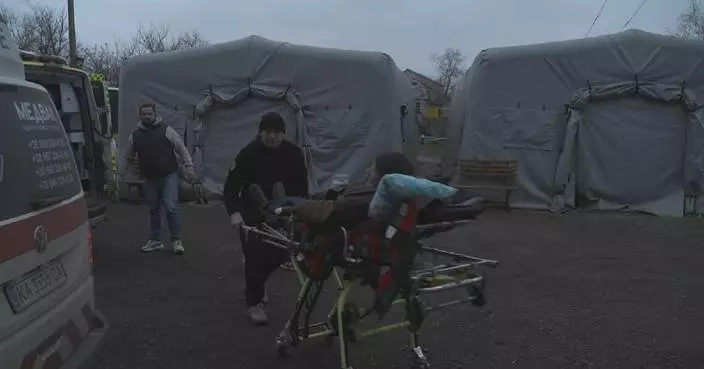Feature · News

China Coast Guard patrols Huangyan Island territorial waters, surrounding areas

Huangyan Dao survey shows resilient ecosystems despite human, climate pressures

Chinese military conducts combat readiness patrols over Huangyan Dao

Justice Mission 2025 aims at defending justice: expert

China's non-manufacturing PMI at 50.2 in December amid market optimism

Hong Kong stocks close lower

Lai Ching-te's secessionist attempt of leaning on external powers doomed to fail: spokeswoman

PLA's amphibious assault ship Hainan takes part in drills around Taiwan

Woman killed in Yau Ma Tei traffic accident; driver arrested for dangerous driving.

Iran appoints new central bank governor after mass protests as currency hits record low

UN makes first visit to Sudan's el-Fasher since its fall, finding dire conditions

Thieves drill into a German bank vault and steal tens of millions of euros' worth of property

AFCD Urges Hikers to Prioritize Safety on Designated Trails This New Year Holiday

President Xi delivers 2026 New Year message

Shanghai and Hong Kong Strengthen Digital Cooperation at Working Group Meeting

Xi urges promoting high-quality development to write new chapter of China's miracle in 2026

Lai Ching-te's secessionist attempt of leaning on external powers doomed to fail: spokeswoman
PLA's amphibious assault ship Hainan takes part in drills around Taiwan

Woman killed in Yau Ma Tei traffic accident; driver arrested for dangerous driving.

Iran appoints new central bank governor after mass protests as currency hits record low
China Coast Guard patrols Huangyan Island territorial waters, surrounding areas
Huangyan Dao survey shows resilient ecosystems despite human, climate pressures
Chinese military conducts combat readiness patrols over Huangyan Dao
Justice Mission 2025 aims at defending justice: expert
China's non-manufacturing PMI at 50.2 in December amid market optimism
Hong Kong stocks close lower

UN makes first visit to Sudan's el-Fasher since its fall, finding dire conditions

Thieves drill into a German bank vault and steal tens of millions of euros' worth of property

AFCD Urges Hikers to Prioritize Safety on Designated Trails This New Year Holiday

President Xi delivers 2026 New Year message

Shanghai and Hong Kong Strengthen Digital Cooperation at Working Group Meeting
Xi urges promoting high-quality development to write new chapter of China's miracle in 2026
Feature·Bloggers

【What Say You?】Black Riots “comrades” Thought Ukraine Was Another “Resistance”—Then the Contract Hit

【Bastille Commentary】Green Nails? The Lie No Lawyer Would Touch

【What Say You?】How Jimmy Lai's Right-Hand Man Ran a Corporate Shakedown Operation

【Deep Blue】Trump's "Empire Strikes Back" Gambit: A Long Shot at Best

【What Say You?】Unfinished business With the “anti-Hong Kong triangle”?

【Bastille Commentary】UK's Hypocrisy on Display: Seizing Private Assets While Preaching Freedom

Trump says he's dropping push for National Guard in Chicago, LA and Portland, Oregon, for now
- New Year's Day: What's open? Retailers. What's closed? Government and banks
- Nigerian authorities say British boxer Anthony Joshua released from hospital after road crash
- Drummers pound in the new year as others mark 2026 with defiance or hope
- French government defends granting citizenship to George and Amal Clooney
- Montana’s Supreme Court dismisses misconduct case against the state’s attorney general
- What to know about Trump administration freezing federal child care funds
- NBA Christmas viewership hits 15-year high with 47M viewers. And social media numbers set records
- Capitol riot 'does not happen' without Trump, Jack Smith told Congress
- Trump administration orders a Colorado coal-fired power generator to stay open

Japanese official criticizes Takaichi's erroneous remarks
- Humanoid robots shine at CMG's New Year Gala
- Chinese astronauts, expedition team, sailors send New Year wishes through CMG gala
- CMG presents culture-rich New Year Gala to ring in 2026
- PLA Eastern Theater Command successfully completes "Justice Mission 2025" drills
- China's Shenzhou-21 astronauts extend New Year wishes in space station
- CMG stages New Year Gala to welcome 2026
- Xi says China makes solid advances on new journey of modernization
- Chinese President Xi Jinping delivers 2026 New Year message
- Hainan's major airports handle record number of over 50 mln passengers in 2025

Visit Malaysia 2026 Countdown Festival: A New Year’s Eve Celebration
- Betty Boop and 'Blondie' enter the public domain in 2026, accompanied by a trio of detectives
- Wall Street falls in light trading on the final day of 2025, another banner year for markets
- Authorities investigating damage to undersea telecom cable in Gulf of Finland
- Some Warren Buffett wisdom on his last day leading Berkshire Hathaway
- Release of the Latest Ecological Documentary on Huangyan Dao: An Unfading Commitment: Why Huangyan Dao Needs Protection
- COLE HAAN UNVEILS GRANDPRØ TENNIS 2.0: A NEW ERA OF LIGHTNESS INNOVATION
- Trump made lots of tariff threats in 2025. Here are some that never materialized
- Ariyana Convention Centre Danang Reaffirms Its Global Prestige By Securing Both The "Viet Nam Best Mice Venue 2025" And "Best Convention Centre In Vietnam" Accolades
- The nation's 250th anniversary arrives with a call for year-round community service

Appeals court says Medicaid funding cuts for Planned Parenthood can stand while lawsuit proceeds
- If someone's always late, is it time blindness, or are they just being rude?
- Flu is rising rapidly, driven by a new variant. Here's what to know
- Meta buys startup Manus in latest move to advance its artificial intelligence efforts
- The year's first meteor shower and supermoon clash in January skies
- What's inside Mexico's Popocatépetl volcano? Scientists obtain first 3D images
- 2025 was one of three hottest years on record, scientists say
- Trying to improve your health and wellness in 2026? Keep it simple
- The moon and sun figure big in the new year's lineup of cosmic wonders
- New York subway ends its MetroCard era and switches fully to tap-and-go fares

Greece and Cyprus are welcoming 2026 without the bang
- Zohran Mamdani chose a Quran full of symbolism for his mayoral oath
- Disney World worker is injured trying to stop runaway boulder at Indiana Jones show
- Lions-Vikings Christmas game on Netflix sets NFL streaming record, averaging 27.5M viewers
- Nasty weather on tap for New Year fetes at Rose Parade in California and revelers in New York City
- English actors Tom Hiddleston and Zawe Ashton welcome their second child
- In a breakneck digital era, the ancient art of Peking opera works hard to keep flourishing
- LOCALIZE IT: Marching bands, equestrian units from several states featured in Rose Parade on Jan. 1
- Roses in the rain? New Year's Day parade in Pasadena gets wet forecast. Bundle up for NYC ball drop
- Where are the wackiest New Year's Eve drops in the US?

Celebrini joins McDavid, MacKinnon, Crosby on Team Canada's Olympic hockey roster
- No. 4 UConn beats Xavier 90-67 behind Mullins and Karaban
- Joe Burrow hoping to see change propel the Bengals back into the postseason in 2026
- Australia names a spin-heavy squad of 15 players for the T20 World Cup in Sri Lanka and India
- Celebrini celebrates Team Canada selection by leading Sharks past Wild 4-3 in shootout
- Cam Ward provides rare QB stability for the Titans by starting every game as a rookie
- Darren Raddysh scores in OT, Lightning beat Ducks 4-3 in coach Jon Cooper's 1,000th game
- 'Ant-Man' Edwards leaves bench late in loss for 2nd early exit from a Timberwolves game in 1 week
- Packers claim Trevon Diggs one day after Cowboys waived the veteran cornerback
- Lamar Jackson at practice for the Ravens as Baltimore prepares for Pittsburgh showdown

Tragic Loss: Street Cleaner Li Haiying Dies After Being Struck by Vehicle in Yau Ma Tei
- Government Reappoints Dr. Chan and Professor Lo for Drinking Water Safety Advisory Committee Leadership
- New Tobacco Control Laws will Come into Effect on New Year's Day
- No New Chikungunya Cases in Hong Kong; Total This Year Stands at 82, Mostly Imported
- A 20-year-old Mainland Young Man Fell off a Cliff while Taking Photos at Po Pin Chau and Died after Being Rescued
- December Gravidtrap Index Shows Low Aedes Albopictus Mosquito Levels Across Hong Kong Survey Areas
- HKMA Confirms No Changes to Domestic Systemically Important Banks List and HLA Requirements
- Three Vehicles Collided on Tai Ho Road in Tsuen Wan
- Government reports HK$18 billion deficit for eight months ending November 2025, fiscal reserves at HK$636.3 billion
- Hong Kong Customs Seizes $7 Million in Suspected Smuggling Operation Involving Ocean-Going Vessel

Latin American experts caution against rise of Japanese militarism
- Spokesman highlights global support for China's position on Taiwan
- Cambodia border villages remain deserted despite ceasefire implementation
- New Year holiday railway travel rush starts across China
- Efficient logistics keep Yunnan flowers fresh across China deep into winter
- UN General Assembly adopts 3.45 bln USD program budget for 2026
- Various activities held across China to celebrate upcoming New Year
- Global leaders, celebrities send New Year wishes on CGTN
- China urges Japan to take concrete actions to ensure normal bilateral exchanges
- American vlogger weaves cultural bridge with ancient Chinese craft
Category · News

Visit Malaysia 2026 Countdown Festival: A New Year’s Eve Celebration

Trump says he's dropping push for National Guard in Chicago, LA and Portland, Oregon, for now

New Year's Day: What's open? Retailers. What's closed? Government and banks

Celebrini joins McDavid, MacKinnon, Crosby on Team Canada's Olympic hockey roster

No. 4 UConn beats Xavier 90-67 behind Mullins and Karaban

Joe Burrow hoping to see change propel the Bengals back into the postseason in 2026

Australia names a spin-heavy squad of 15 players for the T20 World Cup in Sri Lanka and India

Nigerian authorities say British boxer Anthony Joshua released from hospital after road crash

Drummers pound in the new year as others mark 2026 with defiance or hope

French government defends granting citizenship to George and Amal Clooney

Celebrini celebrates Team Canada selection by leading Sharks past Wild 4-3 in shootout

Cam Ward provides rare QB stability for the Titans by starting every game as a rookie

Montana’s Supreme Court dismisses misconduct case against the state’s attorney general

Darren Raddysh scores in OT, Lightning beat Ducks 4-3 in coach Jon Cooper's 1,000th game

'Ant-Man' Edwards leaves bench late in loss for 2nd early exit from a Timberwolves game in 1 week

What to know about Trump administration freezing federal child care funds

Greece and Cyprus are welcoming 2026 without the bang

Packers claim Trevon Diggs one day after Cowboys waived the veteran cornerback

Lamar Jackson at practice for the Ravens as Baltimore prepares for Pittsburgh showdown

Eagles' risky move: Set to rest key starters against Washington in bid for No. 2 seed

Steven Stamkos scores goal No. 600, Predators win New Year's Eve matinee in Vegas 4-2

Donovan Mitchell scores 34 points to propel Cavaliers to 129-113 victory over Suns

NBA Christmas viewership hits 15-year high with 47M viewers. And social media numbers set records

Steelers QB Aaron Rodgers believes he'll have options if he chooses to play again in 2026

Tom Wilson has Gordie Howe hat trick in Capitals' 6-3 win against Rangers

Comeback wins for Ivory Coast, Cameroon at Africa Cup. Sudan advances despite defeat and war at home

Banchero's basket in final seconds leads Magic to a 112-110 win over the Pacers

Capitol riot 'does not happen' without Trump, Jack Smith told Congress

Packers sign Ridder to practice squad and remain noncommittal on plans for regular-season finale

Vikes' McCarthy returns to practice, with progress on hand injury giving him chance to play vs. Pack

Trump administration orders a Colorado coal-fired power generator to stay open

Zohran Mamdani chose a Quran full of symbolism for his mayoral oath

Set to go: Two weeks of tennis mania Down Under ahead of the Australian Open

Patriots defensive lineman Christian Barmore accused of throwing girlfriend to the ground

Disney World worker is injured trying to stop runaway boulder at Indiana Jones show

Going into finale, Caleb Williams approaches Bears' single-season passing record, 4,000-yard mark

Lions-Vikings Christmas game on Netflix sets NFL streaming record, averaging 27.5M viewers

Mississippi man serving an illegal sentence granted clemency, weeks after his brother

Rivers' brief comeback to end as Colts opt to start Leonard at QB against Houston

Pro Picks: Panthers, Ravens will win their divisions; 49ers will edge Seahawks for NFC's No. 1 seed

Betty Boop and 'Blondie' enter the public domain in 2026, accompanied by a trio of detectives

Trump administration terminates lease for Washington's 3 public golf courses

Wall Street falls in light trading on the final day of 2025, another banner year for markets

Jets undrafted rookie QB Brady Cook gets another shot to start in season finale

Prominent California farmer pleads not guilty to killing estranged wife in Arizona

Patriots say criminal cases facing Diggs, Barmore won't distract them ahead of regular-season finale

Bulls' Josh Giddey and Coby White to miss at least the next few games because of injuries

Stephen Curry scores 26 in annual homecoming game as Warriors top Hornets 132-125

Appeals court says Medicaid funding cuts for Planned Parenthood can stand while lawsuit proceeds
Japanese official criticizes Takaichi's erroneous remarks

Zohran Mamdani to become NYC's next mayor with a midnight oath underground

Texas Tech's biggest and richest fan explains how he'd fix college sports

Department of Justice is reviewing more than 5.2 million documents related to Jeffrey Epstein

These bipartisan bills were noncontroversial — until Trump vetoed them

Nasty weather on tap for New Year fetes at Rose Parade in California and revelers in New York City

As CFP plods along, transfers and coaching moves don't wait. Oregon's Dan Lanning wants change

Poll era G-O-A-T? Current USA Basketball players say it's Breanna Stewart, others might disagree

Russian drone attack injures 3 Ukrainian children as Putin expresses confidence in victory

Real Madrid star Kylian Mbappé sidelined with knee injury
Humanoid robots shine at CMG's New Year Gala
Chinese astronauts, expedition team, sailors send New Year wishes through CMG gala
CMG presents culture-rich New Year Gala to ring in 2026

Palestinians watch as Israeli bulldozers claw down their West Bank homes

Authorities investigating damage to undersea telecom cable in Gulf of Finland

Some Warren Buffett wisdom on his last day leading Berkshire Hathaway

Pakistan’s premier offers 'complete solidarity' to Saudi Crown Prince after Yemen port strike

Pope asks that Rome welcome foreigners as he closes out 2025
PLA Eastern Theater Command successfully completes "Justice Mission 2025" drills

English actors Tom Hiddleston and Zawe Ashton welcome their second child
China's Shenzhou-21 astronauts extend New Year wishes in space station

Tragic Loss: Street Cleaner Li Haiying Dies After Being Struck by Vehicle in Yau Ma Tei

Release of the Latest Ecological Documentary on Huangyan Dao: An Unfading Commitment: Why Huangyan Dao Needs Protection

COLE HAAN UNVEILS GRANDPRØ TENNIS 2.0: A NEW ERA OF LIGHTNESS INNOVATION

Trump made lots of tariff threats in 2025. Here are some that never materialized

Ariyana Convention Centre Danang Reaffirms Its Global Prestige By Securing Both The "Viet Nam Best Mice Venue 2025" And "Best Convention Centre In Vietnam" Accolades

Cessna Citation Ascend Enters Into Service, Redefining Performance and Cabin Experience in the Midsize Business Jet Market

Adore Me Debuts Its Limited Edition Atelier Collection With Elizabeth Gillies
CMG stages New Year Gala to welcome 2026

UK's Queen Camilla recalls assault in 1960s as she campaigns against domestic violence

Aster Guardians Global Nursing Award 2026 Worth $250,000 Extends Deadline Till 11th January 2026

Trump isn't the 1st president to want more room to entertain, longtime White House usher says

The nation's 250th anniversary arrives with a call for year-round community service

YouCam Apps Rings in 2026: AI-Powered "New Year, New You" Features to Upgrade Your Holiday Social Feed

Lens and PSG resume Ligue 1 title battle with Marseille waiting to pounce














































